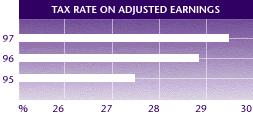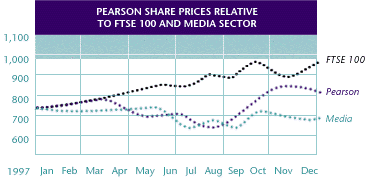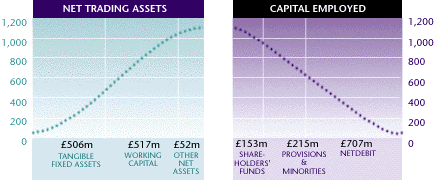




Financial Review
Non-operating Items
These were significant in both 1996 and 1997 and affected pre-tax profits in a way that masks the real progress of the Group. The disposal of Westminster Press in 1996 resulted in an exceptional profit of £231.3m, while the 1997 accounts were affected by the decision to take a charge of £212.0m in relation to the value of Mindscape. These two items were the principal reason for the reduction in pre-tax profits from £356.8m in 1996 to £128.6m in 1997.
Interest
The net interest charge rose by £7.8m to £37.3m in 1997, reflecting the increase in debt levels resulting from the acquisition of Putnam Berkley.
Changes in interest rates did not have a significant effect. US dollar interest rates were little changed from 1996, and the impact of higher sterling interest rates was limited because, for most of the year, we had more cash in sterling than floating rate sterling borrowings.
Interest cover, operating profit expressed as a multiple of net interest expense, was nine times in 1997, at the upper end of the Group’s target range of five to nine times.
Taxation
The tax charge of £88.6m represents an effective rate of 68.9%: this very high rate results from the fact that there is no current tax relief for the charge of £212.0m against Mindscape goodwill. Excluding this provision, the effective rate was 26.0% compared with 30.4% in 1996. The overall tax rate on non-operating items, excluding Mindscape, was very low, mainly because tax payable on UK disposals was reduced by capital losses and indexation.

A more meaningful comparison can be made between the tax rates on adjusted earnings. This rate increased from 28.8% to 29.4%, notwithstanding the reduction from 33% to 31.5% in the rate of UK corporation tax applicable to the Group’s profits for the year. The largest single factor in this effective increase was that 1996 earnings reflected a non-recurring benefit of £8.8m arising from Pearson’s holding in BSkyB, the UK satellite television operator. The main reason for the tax charge remaining below the UK statutory rate was that tax losses available in the USA allowed us to provide no significant tax on the Group’s profits arising there. This more than offset the fact that, in most other countries where the Group operates, the local tax rate exceeded the UK rate.
Looking forward, the prospective reduction in the UK corporate tax rate to 30% will clearly benefit the Group, although this will be offset by the acceleration of tax payments which will result from the move to a quarterly payments system in the UK. Our present best estimate is that the net effect will be broadly neutral to the Group. The prospective abolition of Advance Corporation Tax (ACT) should not affect our stated tax rate, since we have not had to write off ACT in recent years. The additional flexibility which the abolition of ACT will provide to Pearson in planning its affairs is, however, helpful.
Minorities
Minority interests decreased from £7.7m in 1996 to £1.7m in 1997 following the increase in our shareholding of Recoletos to 94.2% towards the end of 1996. The strategic alliance with Telefónica, Spain’s leading telecommunications company, will mean, however, that the minority interest in Recoletos will increase again in 1998 as Telefónica takes a 20% stake.

Dividends
Pearson has an excellent record of increasing the dividend paid to shareholders. The Company’s management is committed to build on that tradition, increasing dividends at a rate comfortably in excess of the UK inflation rate. At the same time, management currently sees opportunities to earn a return in excess of the Company’s cost of capital through investment in the business and will therefore be aiming to rebuild dividend cover (adjusted earnings per share expressed as a multiple of net dividend per share) from the present level of 1.8 times (based on the 1997 recommended dividend) to a minimum level of two times. We do not expect this increase to be achieved in a single year, and we shall also be mindful, in considering the appropriate level of the dividend, of the level of the company’s cash earnings. In addition we shall actively consider the return of capital to shareholders when that course of action is justified by a high level of corporate liquidity, a shortage of investment proposals which meet our criteria or the level of the Company’s share price. The board is recommending to shareholders a final dividend of 12p per share to produce a total for the year of 19.5p, which represents an increase of 8.3% on the 1996 payment.
Cash Flow
The significant influences on operating cash flow, the knock-on effect of the Penguin problem on 1997 receivables collection and the heavy investment in the Shared Services initiative, have been described above. They resulted in 1997 dividend payments being less than fully funded by the cash flow available after interest and tax. This cash shortfall resulted in some increase in debt levels in 1997, although a much more significant factor was the excess of acquisition spending over disposal proceeds. This resulted in a year-end net debt level of £707m, up from £430m a year earlier. By the end of March 1998, disposals had reduced net debt to a pro forma level of £392m.

| Top of Page |